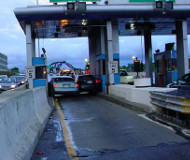8/16/2016
New York: Court Declares Toll Diversion IllegalFederal judge finds New York toll road system violated the constitution by using motorist funds to subsidize recreational facilities.

Motorists will no longer be forced to pay road tolls to fund New York's 525-mile network of barge canals thanks to a federal court ruling handed down last week. The American Trucking Associations sued the state, arguing that road users have paid over a billion dollars in tolls that enriched the New York State Canal System without any tangible benefits for the highway system. US District Court Judge Colleen McMahon agreed that the diversion of tolls for non-motoring purposes was unconstitutional.
Judge McMahon had initially tossed the lawsuit on technical grounds, but she was shot down by the Second Circuit US Court of Appeals, which sent the case back for a ruling on the merits. The second time around, Judge McMahon sided with the truckers.
"The canals and adjacent lands are presently used for many purposes, most of them recreational, but very few of them are related to transportation," Judge McMahon wrote in her decision. "And therein lies the rub."
The barge canal system does charge tolls to canal users, but this generates only around $2 million a year in user fees -- not enough to cover expenses that run from $60 to $90 million annually. Over a span of five years, motorists paid $3.2 billion in tolls in New York, but the road system only required $1.9 billion to fund. The leftover cash was funneled into the canals to cover the deficit.
Commercial truckers are responsible for about 37 percent of the toll road revenue in New York while being responsible for 10 percent of the traffic. The court found the toll diversion had a significant impact on the industry.
"Notwithstanding the importance of the canal system to the state of New York, the record contains not a scintilla of evidence that long-distance truckers, in their capacity as commercial drivers on the toll roads known as the New York State Thruway, derive any benefit whatever from the canal system's waterways, its museums and educational attractions, and the parks and recreational areas adjacent to the historic barge canals," Judge McMahon ruled.
The truckers' suit was limited in scope, asking for a refund only for the portion of tolls paid that went to subsidize the canals. Instead of going back to the start of the diversion in 1992, the suit asks for refunds for overpayment over the past six years. The court found the demand reasonable in light of the New York's violation of the "Dormant Commerce Clause" of the US Constitution, which prohibits states from discriminating against interstate commerce with toll rates that were indisputably unfair.
"There can, therefore, be absolutely no question that the tolls paid by the plaintiff class are 'excessive' in relation to the benefits that the truckers are receiving in their capacity as truckers, because 9 to 14 percent of what truckers pay in tolls is used for a purpose other than giving them and other motorists access to well maintained and trooper-patrolled highways that will enable and expedite their trips," Judge McMahon wrote. "To that extent, the tolls are unconstitutionally high."
The ruling noted that diversion of tolls is only permissible for "functionally related" purposes, such as transit systems that -- in theory -- reduce the traffic burden for tollpayers. It concluded that the sole purpose of the diversion was to avoid difficult decisions about taxation and spending on the canals.
"The state of New York cannot insulate the canal system from the vagaries of the political process and taxpayer preferences by imposing the cost of its upkeep on those who drive the New York Thruway in interstate commerce," Judge McMahon concluded.
The American Trucking Associations celebrated the ruling in a statement last week.
"We hope today's ruling will not only end this practice in New York, but dissuade other states from financing their budget shortfalls on the backs of our industry," ATA President Chris Spear said.
A copy of the ruling is available in a 500k PDF file at the source link below.


